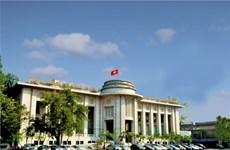Flexible policies help boost agricultural production
The Ministry of Agriculture and Rural Development (MARD) organised a
workshop to discuss solutions to change the usage of 112,000 hectares of
ineffective rice-growing land for other crops in early May in Tien
Giang province, the Communist Party of Vietnam (CPV) Online Newspaper
reported.
The Ministry of Agriculture and Rural Development (MARD) organised a
workshop to discuss solutions to change the usage of 112,000 hectares of
ineffective rice-growing land for other crops in early May in Tien
Giang province, the Communist Party of Vietnam (CPV) Online Newspaper
reported.
Accordingly, the central budget will support farmers with 2 million VND per hectare to buy seeds to change from rice-growing to planting vegetables and crops in spring-summer, summer-autumn, autumn-winter harvests of 2014 and the winter-spring harvest of 2014-2015.
It is necessary to change ineffective rice-growing areas for planting other crops in order to ensure income for farmers as the rice prices are very precarious and farmers find it hard to sell their rice. Although Prime Minister Nguyen Tan Dung has issued Decision No. 580 on the support policy for shifting cultivation, the cultivating change in many localities occurs slowly due to various reasons.
In the recent past, many vegetables and crops such as sweet potato, sesame, corn, tuberose flower, vegetables and water melon brought higher economic efficiency as compared to rice cultivation. However, crops often prevail when they are cultivated in small areas and low yield, but when cultivated on a large scale, the situation of “bumper crops and low price” can happen and farmers have to bear the consequences.
This is the reason behind the agricultural sector and local authorities exercising caution when recommending the change from rice to vegetables and other crops. Departments responsible for agriculture and rural development in the Mekong Delta said that in terms of technique, the agricultural sector can support farmers to produce vegetables and other crops all year round, ensuring high productivity and quality. However, where the products are sold, who will buy them and how much they are sold for are beyond departments' control.
Many people raise questions about the responsibilities of the industry and trade sector, trade promotion centres, businesses and cooperatives. Regardless of such discussion many agricultural and aquatic products have still met difficulties in consumption. Although the Government has guidelines for conversion to agricultural crops, the agricultural sector and farmers are still worried about the consumption. Consequently they see that great risk can be encountered.
Along with the planting conversion, the Prime Minister has also issued a policy on debt restructuring and rescheduling loan payment for another 3 years for farmers who are experiencing difficulties in raising shrimp and tra fish. The support policy requires banks consider new loans to enable farmers to resume production.
However, the implementation of the support policy is slow and this has made farmers miss their production opportunities.
So far, the economy of many localities still depends on agriculture and it is considered as a pillar of social security. Over the past time, the Government has issued many policies and mechanisms to promote agricultural development, and to reach out to the world. However, the gap between the policies and realities has not been reduced.
Creating favourable conditions for farmers will boost production and allow them to meet market demand in terms of both quality and quantities.-VNA
Accordingly, the central budget will support farmers with 2 million VND per hectare to buy seeds to change from rice-growing to planting vegetables and crops in spring-summer, summer-autumn, autumn-winter harvests of 2014 and the winter-spring harvest of 2014-2015.
It is necessary to change ineffective rice-growing areas for planting other crops in order to ensure income for farmers as the rice prices are very precarious and farmers find it hard to sell their rice. Although Prime Minister Nguyen Tan Dung has issued Decision No. 580 on the support policy for shifting cultivation, the cultivating change in many localities occurs slowly due to various reasons.
In the recent past, many vegetables and crops such as sweet potato, sesame, corn, tuberose flower, vegetables and water melon brought higher economic efficiency as compared to rice cultivation. However, crops often prevail when they are cultivated in small areas and low yield, but when cultivated on a large scale, the situation of “bumper crops and low price” can happen and farmers have to bear the consequences.
This is the reason behind the agricultural sector and local authorities exercising caution when recommending the change from rice to vegetables and other crops. Departments responsible for agriculture and rural development in the Mekong Delta said that in terms of technique, the agricultural sector can support farmers to produce vegetables and other crops all year round, ensuring high productivity and quality. However, where the products are sold, who will buy them and how much they are sold for are beyond departments' control.
Many people raise questions about the responsibilities of the industry and trade sector, trade promotion centres, businesses and cooperatives. Regardless of such discussion many agricultural and aquatic products have still met difficulties in consumption. Although the Government has guidelines for conversion to agricultural crops, the agricultural sector and farmers are still worried about the consumption. Consequently they see that great risk can be encountered.
Along with the planting conversion, the Prime Minister has also issued a policy on debt restructuring and rescheduling loan payment for another 3 years for farmers who are experiencing difficulties in raising shrimp and tra fish. The support policy requires banks consider new loans to enable farmers to resume production.
However, the implementation of the support policy is slow and this has made farmers miss their production opportunities.
So far, the economy of many localities still depends on agriculture and it is considered as a pillar of social security. Over the past time, the Government has issued many policies and mechanisms to promote agricultural development, and to reach out to the world. However, the gap between the policies and realities has not been reduced.
Creating favourable conditions for farmers will boost production and allow them to meet market demand in terms of both quality and quantities.-VNA













